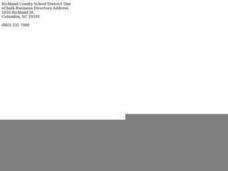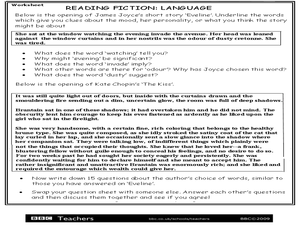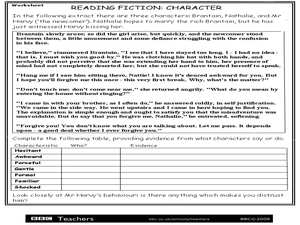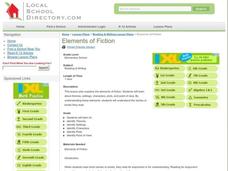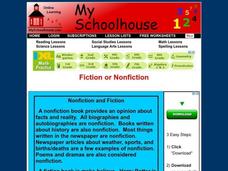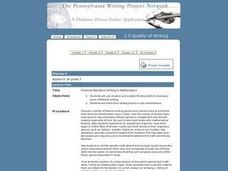Curated OER
Life Size Characters
Sixth graders analyze character traits and create a life size character outline. In this character analysis lesson, 6th graders analyze character traits of a character using character webs and poems. Students then create a life size...
Curated OER
Writing Fiction
In this story-writing worksheet, students complete 20 blanks in two different graphic organizers. Each graphic organizer guides students through creating interesting story characters.
Curated OER
Reading fiction: language
In this fiction worksheet, students read passages from 2 fiction stories and answer short answer questions about them. Students answer 5 questions about 1 story and formulate 15 questions about another.
Curated OER
Reading Fiction: Sentences
In this reading fiction-sentences worksheet, students read two selections from Dickens and Joyce, analyzing the pace and underlining words that create the effect that the author wants.
Curated OER
Reading Fiction: Character
In this reading fiction: characters worksheet, students read a short passage, then complete the table giving characteristics of the 3 characters by identifying the character and providing evidence for the answer.
Curated OER
Writing Fiction lesson plan
Students compose a opening paragraph that sets the scene and foreshadows events. In this writing fiction lesson, students write an opening paragraph about a mugging and describe the scene in a way that foreshadows something bad is...
Curated OER
A Hodgepodge of Literature
Students complete multiple lessons to study various literature including poetry, fiction, tall tales, and phrases. In this literature lesson, students complete six lessons about poetry, fiction, and idioms.
Curated OER
Elements of Fiction
Students identify key story elements in a fiction text. In this literacy lesson, students are introduced to the various elements of fiction such as the setting, plot, and theme. Students read a short story of their choice and identify...
Curated OER
Fact or Fantasy
For this fact and fantasy worksheet, students write some true and false statements about their summer activities. Students write 8 statements.
Curated OER
Understand the Difference Between Fiction and Non-Fiction
In this fiction and non-fiction worksheet, students cut out 9 sentence strips, read them, and classify each of them as fact or fiction.
Curated OER
Fiction or Nonfiction
In this online interactive fiction and non-fiction instructional activity, students respond to 7 fill in the blank and multiple choice questions regarding the information included in the provided paragraphs.
Curated OER
Fact or Fiction
In this fact or fiction activity, students read 10 sentences and decide if it is a fact or fiction. Students check the correct column for each answer.
Curated OER
School-Home Links: Fiction and Nonfiction
In this book genre instructional activity, students read the titles of four different books and then write F for fiction or NF for nonfiction on the lines below the books. Parents or guardians must sign the instructional activity.
Curated OER
Fiction and Nonfiction - School-Home Links
In this genre worksheet, 3rd graders review the difference between fiction and nonfiction literature. They write an X on the correct line for each of 6 titles which tells if the book is fiction, nonfiction, or other. There is a place for...
Curated OER
A PERFECT BEACH HAT
In this reading comprehension instructional activity, students read and analyze the short story "A Perfect Beach Hat" and then answer five comprehension questions over the story.
Curated OER
Fictional Narrative Writing in Mathematics
Fifth graders discuss variety of fictional writing genres and connect each to familiar story that has been read, use creative and analytical skills to develop original piece of fictional writing that incorporates math skill, and share...
Curated OER
Quality of Information: Point of View and Bias
Fifth graders identify stereotypes of Indian people based on perceived characteristics. They discuss the misconceptions. Students define quality of information and give an example from the story "Seaman's Journal: On The Trail With Lewis...
Curated OER
Building Fiction: Elements of a Short Story
Students define and interpret the elements found in a short story. Then they identify the elements of plot found in a short story. Students also apply knowledge of plot to an original work of fiction. Finally, they identify the...
Curated OER
Fiction vs. Nonfiction
Young scholars explore fiction and nonfiction writing. They identify the elements of fiction in a short story and identify the criteria necessary in a nonfiction piece. Students distinguish the author's purpose in an expository text,...
Curated OER
Sherlock Holmes: Teaching English Through Detective Fiction
Learners read examples of mysteries and detective fiction. With a focus on Sherlock Holmes, they are introduced to the techniques for reading properly. In groups, they define new vocabulary, make predictions and summarize the stories. ...
Curated OER
Catching on to Catcher in the Rye
Learners conduct Internet research to analyze Holden Caulfield from the novel, the Catcher in the Rye. Once they have researched various sites to gain insight into Caulfield's problems, they write letters from one character to another. ...
Curated OER
Charlie and the Chocolate Factory
Fourth graders research and write an author report on Roald Dahl, including books written by him, birthplace, family life, and other information on his writing. Students read aloud chapters in the book. Students create a newspaper...
Curated OER
Real or hoax?
Seventh graders brainstorm a list of criteria that makes a webpage useful for research and not useful for research. They complete the activity, "Real or Hoax," and discuss fiction and non fiction stories and determine which websites are...
Curated OER
Fictional Hereos
Students are introduced to the definition of a hero. As a class, they compare and contrast the difference between non-fictional and fictional hereos they have read about. They read a story, create a story map of one of the heroes and...


